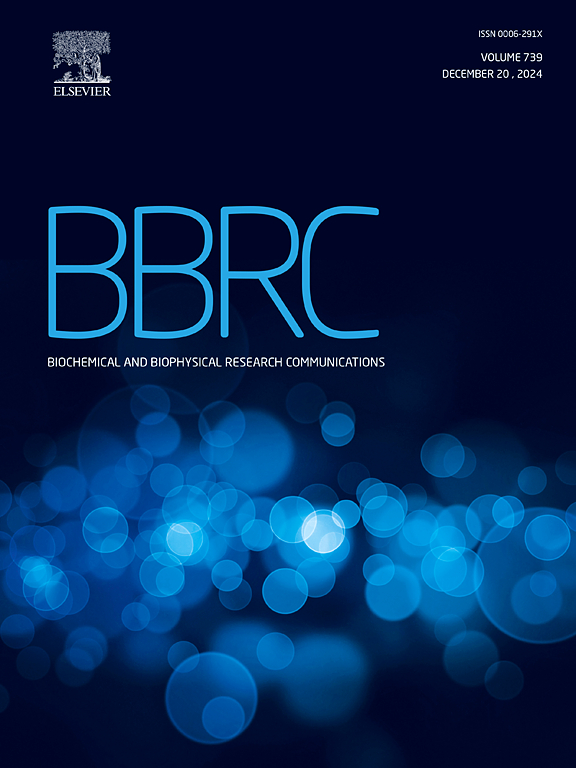Effects of the regenerating gene family on DSS-induced ulcerative colitis in a mouse model
IF 2.5
3区 生物学
Q3 BIOCHEMISTRY & MOLECULAR BIOLOGY
Biochemical and biophysical research communications
Pub Date : 2025-04-25
DOI:10.1016/j.bbrc.2025.151894
引用次数: 0
Abstract
Ulcerative colitis (UC) is a chronic inflammatory bowel disease (IBD) characterized by immune dysregulation and defective mucosal healing, predominantly affecting the colonic and rectal mucosa with diffuse inflammation and ulceration. Its pathogenesis involves genetic susceptibility, immune dysfunction, and environmental triggers. The regenerating gene (Reg) family, identified over four decades ago, is upregulated in IBD and has been implicated in anti-inflammatory responses, tissue regeneration, and mucosal barrier maintenance. Among these, Reg1 and Reg3 have been proposed as potential therapeutic targets due to their roles in promoting intestinal epithelial repair in both human and mice. In this study, we investigated the role of Reg1-3(Reg1, Reg2, Reg3a, Reg3b, Reg3d, Reg3g) genes using a dextran sulfate sodium (DSS)-induced UC mouse model. C57BL/6J wild-type (WT) and Reg1-3(Reg1, Reg2, Reg3a, Reg3b, Reg3d, Reg3g) knockout (Reg−/−) mice (6–11 weeks old; n=3–8 per group) were treated with 2 % DSS in drinking water for 5 days. Body weight, histological changes, gene expression (qRT−PCR), and protein levels (Western blotting, immunohistochemistry) were evaluated at day 7, day 14, and day 28. No significant differences were observed in inflammation, tissue damage, or repair between Reg−/− and WT mice, suggesting that Reg1-3 genes may not be essential in this model or that compensatory mechanisms might mitigate their loss. These findings highlight the need for further investigation into the functional redundancy and context-dependent roles of Reg genes in UC.
再生基因家族对dss诱导的溃疡性结肠炎小鼠模型的影响
溃疡性结肠炎(UC)是一种以免疫失调和粘膜愈合缺陷为特征的慢性炎症性肠病(IBD),主要影响结肠和直肠粘膜,伴有弥漫性炎症和溃疡。其发病机制涉及遗传易感性、免疫功能障碍和环境诱因。再生基因(Reg)家族在40多年前被发现,在IBD中表达上调,并与抗炎反应、组织再生和粘膜屏障维持有关。其中,Reg1和Reg3被认为是潜在的治疗靶点,因为它们在人类和小鼠中都能促进肠上皮修复。在这项研究中,我们利用葡聚糖硫酸钠(DSS)诱导的UC小鼠模型研究Reg1-3(Reg1, Reg2, Reg3a, Reg3b, Reg3d, Reg3g)基因的作用。C57BL/6J野生型(WT)和Reg1-3(Reg1、Reg2、Reg3a、Reg3b、Reg3d、Reg3g)敲除小鼠(6-11周龄;n= 3-8(每组),在饮用水中添加2% DSS治疗5 d。在第7天、第14天和第28天评估体重、组织学变化、基因表达(qRT−PCR)和蛋白质水平(Western blotting、免疫组织化学)。Reg−/−和WT小鼠在炎症、组织损伤或修复方面未观察到显著差异,这表明Reg1-3基因在该模型中可能不是必需的,或者代偿机制可能减轻了它们的缺失。这些发现强调了进一步研究Reg基因在UC中的功能冗余和上下文依赖作用的必要性。
本文章由计算机程序翻译,如有差异,请以英文原文为准。
求助全文
约1分钟内获得全文
求助全文
来源期刊
CiteScore
6.10
自引率
0.00%
发文量
1400
审稿时长
14 days
期刊介绍:
Biochemical and Biophysical Research Communications is the premier international journal devoted to the very rapid dissemination of timely and significant experimental results in diverse fields of biological research. The development of the "Breakthroughs and Views" section brings the minireview format to the journal, and issues often contain collections of special interest manuscripts. BBRC is published weekly (52 issues/year).Research Areas now include: Biochemistry; biophysics; cell biology; developmental biology; immunology
; molecular biology; neurobiology; plant biology and proteomics

 求助内容:
求助内容: 应助结果提醒方式:
应助结果提醒方式:


